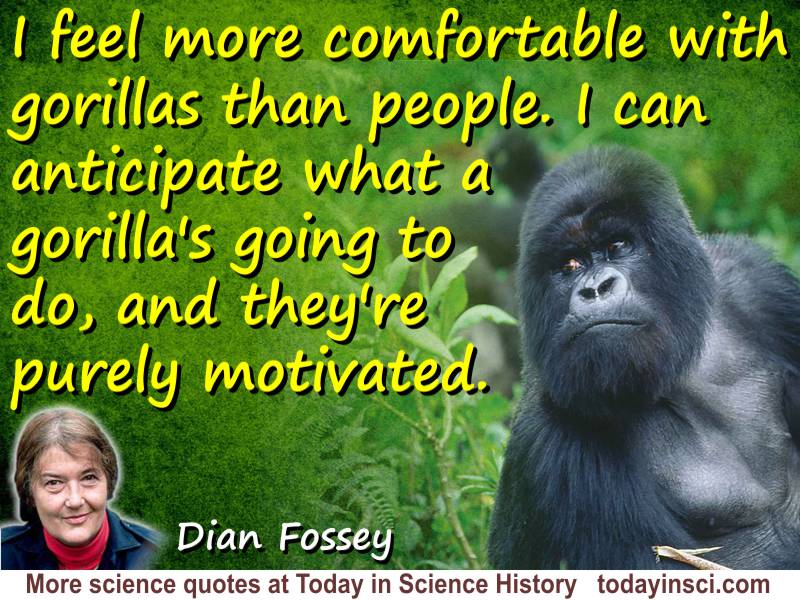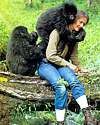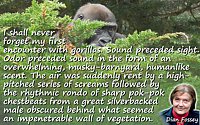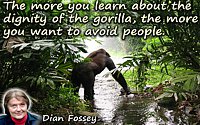Today in Science History - Quickie Quiz
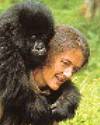 (source)
(source)
|
Dian Fossey
(16 Jan 1932 - 26 Dec 1985)
American zoologist who spent years studying and protecting the mountain forest gorillas of Rwanda, central Africa, about which she wrote in Gorillas in the Mist (1983).
|
Dian Fossey - I feel more comfortable with gorillas
Illustrated Quote - Large (800 x 600 px)
“I feel more comfortable with gorillas than people. I can anticipate what a gorilla's going to do, and they're purely motivated.”
— Dian Fossey
In New York Times (1981)
This quote appears in an article by Nan Robertson written as a “Special to the New York Times.” The journalist was covering the week-long symposium on the Sweet Briar College campus, which brought together three famed primatologists: Dian Fossey, Jane Goodall and Biruté Galdikas. They were at the meeting to talk about “What We Can Learn About Humankind From the Apes.” The reporter managed to interview them in conversations “wedged between lectures and gala meals.”
Competing with the sound of a nearby cocktail party in the Sweet Briar president's house, the reporter spoke with Dr. Fossey, who had put her hands over her ears, complaining, “I can't stand the noise back here.” She compared “the silence of the forest.” The article continued quoting Fossey:
“I feel more comfortable with gorillas than people. I can anticipate what a gorilla’s going to do, and they're purely motivated. It is true that there comes a time when I do literally dream about McDonald’s. I dream of supermarkets and drug stores, potato chips and the Sunday morning paper. That's the beginning and the end of it.”
The article concluded with a similar sentiment from Dr. Goodall:
I don't care two hoots about civilization. I want to wander about in the wild.
Text by Webmaster, with quotes from Nan Robertson in 'Three Who Have Chosen a Life in the Wild',
New York Times (1 May 1981), B36.
(source)See also:
- Science Quotes by Dian Fossey.
- 16 Jan - short biography, births, deaths and events on date of Fossey's birth.
-
Dian Fossey - context of quote The dignity of the gorilla - Medium image (500 x 350 px)
-
Dian Fossey - context of quote The dignity of the gorilla - Large image (800 x 600 px)
-
Dian Fossey - context of quote I feel more comfortable with gorillas - Medium image (500 x 350 px)
-
Dian Fossey - context of quote My first encounter with gorillas - Medium image (500 x 350 px)
-
Dian Fossey - context of quote My first encounter with gorillas - Large image (800 x 600 px)
- Gorillas in the Mist, by Dian Fossey. - book suggestion.
Nature bears long with those who wrong her. She is patient under abuse. But when abuse has gone too far, when the time of reckoning finally comes, she is equally slow to be appeased and to turn away her wrath. (1882) --
Nathaniel Egleston, who was writing then about deforestation, but speaks equally well about the danger of climate change today.
 Carl Sagan
Carl Sagan: In science it often happens that scientists say, 'You know that's a really good argument; my position is mistaken,' and then they would actually change their minds and you never hear that old view from them again. They really do it. It doesn't happen as often as it should, because scientists are human and change is sometimes painful. But it happens every day. I cannot recall the last time something like that happened in politics or religion. (1987) ...
(more by Sagan) Albert Einstein: I used to wonder how it comes about that the electron is negative. Negative-positive—these are perfectly symmetric in physics. There is no reason whatever to prefer one to the other. Then why is the electron negative? I thought about this for a long time and at last all I could think was “It won the fight!” ...
(more by Einstein) Richard Feynman: It is the facts that matter, not the proofs. Physics can progress without the proofs, but we can't go on without the facts ... if the facts are right, then the proofs are a matter of playing around with the algebra correctly. ...
(more by Feynman)
 (source)
(source)
